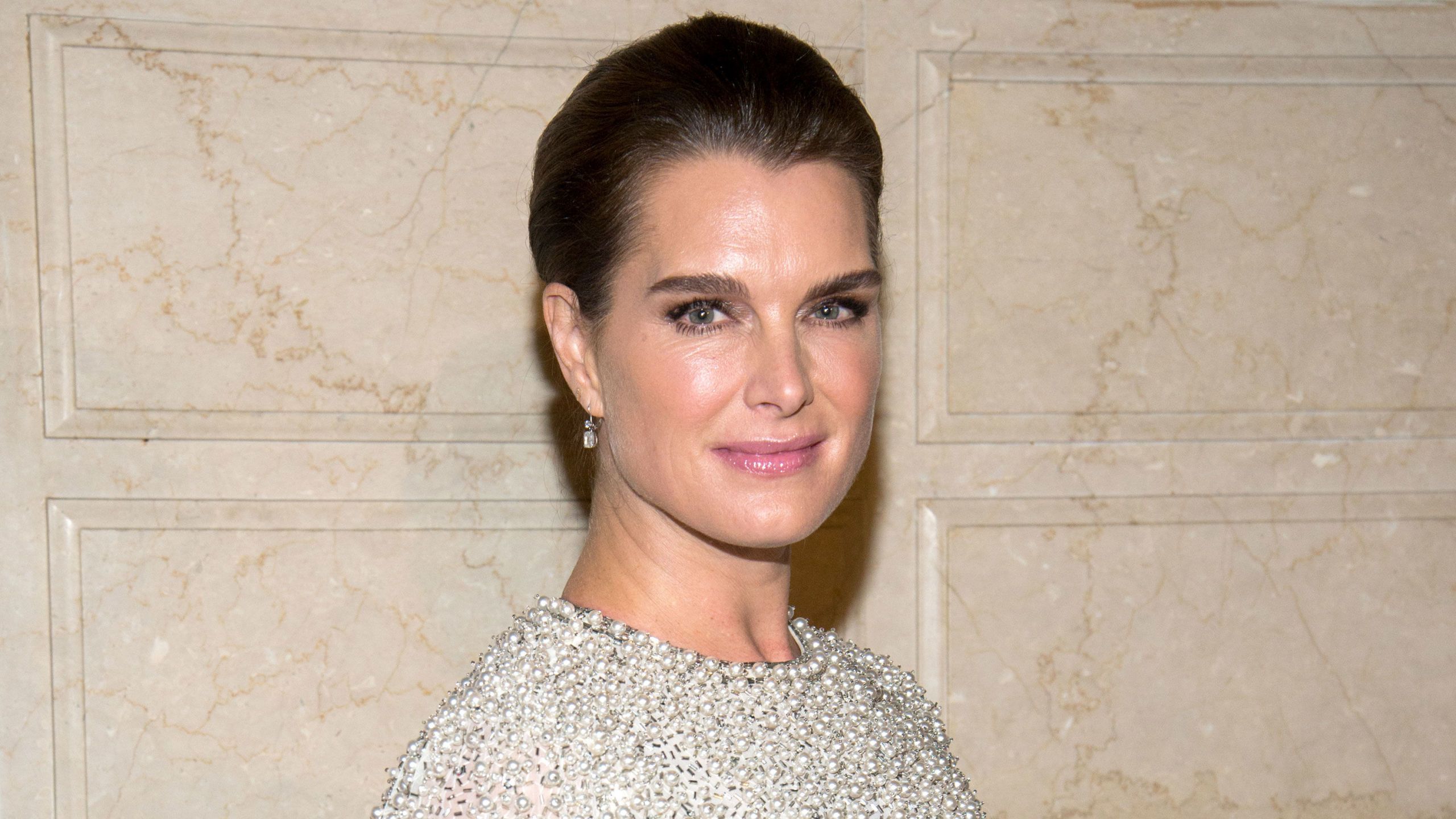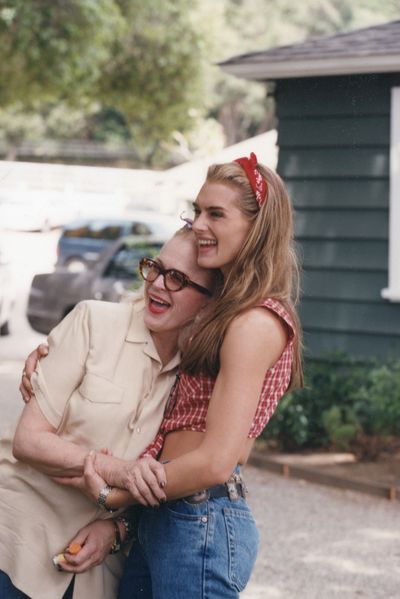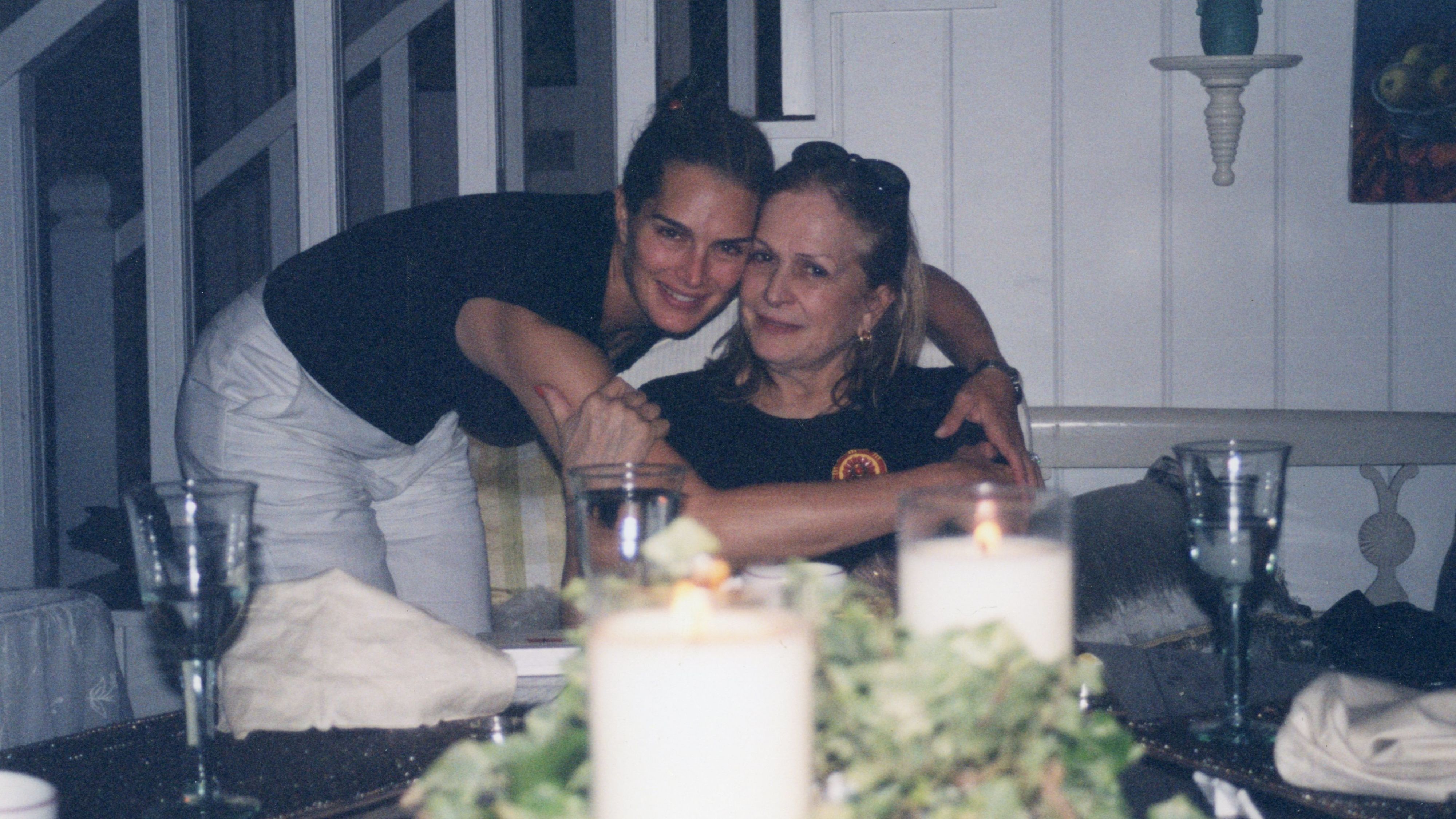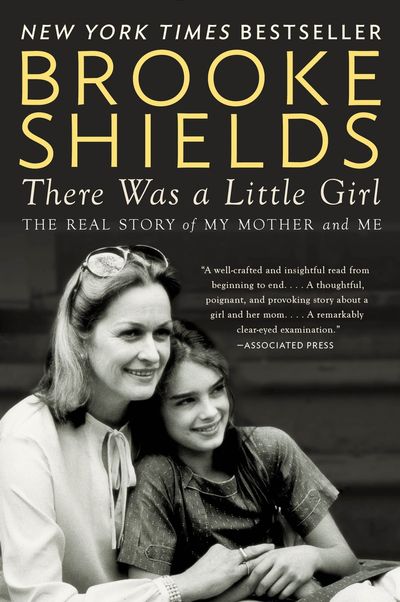Exclusive: Brooke Shields Opens Up About "Resenting" Aspects of Motherhood
In this excerpt from the new edition of her book, There Was a Little Girl: The Real Story of My Mother and Me, Brooke Shields sits down for a chat with her friend David Gilbert to reflect on relationship with her mother and how it informed the raising of her daughter, Rowan.

You've been interviewed a thousand times. Do you ever find yourself tripping into the set response in your daily life and you have to say, Wait a minute, I'm not being real, I'm being the persona, or I'm giving them the answer that they want and that I can give easily?
My real friends never ask me the typical tabloid or PR types of questions, but sometimes I will retell a story I may have told on TV to a friend and I lapse into a bit of a showman. In storytelling, there will be times when I'll be talking to someone and I know how it works. I know where the funny is, so I will jump into that, but I'm very cognizant of it. The argument can then be that I'm never real, but it is actually the opposite. I am not being fake at all. I am embracing the theatrical part of myself. I just know which parts of the story will be enjoyable to people. And they're all real parts of me, you know?
Do you like talking about your celebrity or your career with friends? When we met, you were probably ten years old and I was nine. We were talking about our summer, and I said I was at camp. You said you were on Mike Douglas. And I thought, Okay, that's a different kind of summer activity. But you've always had a really great group of real friends and you're a real person, which, when I think of how long you've been famous for, it's shocking that there's anything real about you. Honestly, people want these stories. When someone—maybe another mother at school—says to you, "Tell me about Blue Lagoon," is your thought something like, Okay, I have to perform this a little bit, or is it, Yeah, this is fun to talk about?
It's really fun for me to talk to people who I know I'm safe with. If these conversations started at kindergarten at my children's school, I would be thinking, Oooh, people don't know what to talk about. It's fair—I'm the elephant in the room. Okay, let me be the elephant and I'll be the first one to [makes elephant trumpet sound].
So now when anyone asks about my career or my work, there's absolutely no threat. I'm not worried that they're going to look at me differently. There will always be people who can't help themselves, and I know who they are and I don't fault them. People are human, and who knows how they experienced me before they met me.
Obviously you were very well protected by your mother. You were also normalized by Dwight-Englewood School and by Princeton.
That was my mom's doing, and she and I both fought for it. She did everything she could to keep my life as normal as possible and make sure I had companions around me to make me feel like a regular kid. At her memorial, one of the lawyers who had known us forever came up and said, "It was unprecedented. Your mother would ask for three airline tickets. You couldn't get one ticket, but she was like, 'Well, I'm taking her and she needs a friend.'" So I'm taking my stepsister, Diana, taking her all over, to Japan and Manila and all these places, and I think my mom knew that was really important to me.
Get exclusive access to fashion and beauty trends, hot-off-the-press celebrity news, and more.
I always had this can't-let-them-beat-me attitude. Whether it was my mom's mottos, "Never let 'em see you sweat," or "Fuck 'em if they can't handle it," or just my own stubbornness. Whatever it was, if I was pushed against, I just went further. And that attitude helped me stay grounded, strangely enough.
[pullquote align='C']"If I was pushed against, I just went further. And that attitude helped me stay grounded, strangely enough."[/pullquote]
However, having my first daughter obliterated me. It took away all my power. All of a sudden I was experiencing something so foreign, which I had no response for. I had no resources to rely on. It was not simply about being the good girl, or being polite, or doing my job. A little human being was involved. It was not just me and my mom. It was me and a stranger and no mother for me. The rug was pulled out. And with the level of depression I experienced, I was just waiting to figure out how to slip away. It was so acute. Becoming a mother didn't ground me at all. At least in the beginning. I had felt so much more grounded on my own than with my baby.

Because you had this strong, particular kind of mother, it must have been really intimidating to suddenly have to take on the role of mother yourself.
I resented it. I truly resented it. It had nothing, strangely, to do with my baby. Because I'd been spending my whole life taking care of my mother, and now my mom was not capable of helping, and there I was having to do all the mothering again. And yet, having babies was the only thing I always knew I wanted. I have always wanted a baby and I have always wanted to be a mother. And then all of a sudden I was looking at her like, What can I do for you? I needed to be mothered. I felt incapable of all of it. It was very shocking, very literal to me. But once I got help and the right medication, I became more balanced. Then it was such an escape for me to have kids because I could say no. I had an excuse. Because I'm never someone who says no—God forbid I won't be liked—but suddenly I realized, they were the priority. I didn't have to show up for anybody but mychildren, and that in turn helped me be selfish and look to my own needs for the first time in my life.
I found that having kids opened up my social world a lot, and it seems like for you growing up it was just you and your mother. You'd have your father's family who would come in, but in specific little chunks, so it wasn't like you had a normalized suburban backyard existence or even an urban let's-go-to-the-playground life. Has that been an eye-opening thing?
First it was like a shiny penny, because this real-life stuff is fun. Playdates and mommy-and-me groups and the park, and then you see the inertia of it, and the conversation becomes so vapid. You're just talking about pacifiers and suddenly you think, Oh God, I don't want to do that. I don't fit into that. So then I considered that maybe I'm more of the carry-the-kid-to-every-art-opening mom, and that worked for a while because I loved having Rowan in tow. But then that gets to be too much at times and the older they get, the more they need routine. I did the same thing with the school. I think you jump in and it's all-consuming with the families and the kids and the volunteering at school events. I went in thinking I had to be über-mom—that I could have a career and be a full-time mom. You want to prove to yourself and the community that you can do it all.
Eventually, over time, you realize you can't be everything all the time, but you can try to be your most. Socially it levels out as well. You go from thinking you have to be friends and liked by all the moms and then you realize you don't. You settle a bit. I've got a solid but varied group of families as friends and I genuinely like the parents, and the kids genuinely are friends, and we all play well together—I don't need too much more. I used to love that feeling of chewing up something in my mouth and giving it to my kid, like that mama bird. It was like a badge of honor, you know? And it was like I am better than everybody because I'm cool and nurturing. Then the reality of being a parent kind of kicks in when they're not babies anymore, and then you realize, Oh God, these are humans whose worlds I am shaping. I better not fuck up.
Your mother had so much chutzpah, yet she was always battling being an outsider. How much of that do you think was a role she was playing to mask how insecure she felt? A lot of people have that kind of tough exterior. Did you see that crack clearly, or did the drinking disguise that?
I think, to a certain extent, Mom felt she always had to play a role because I don't think she ever felt she fully belonged anywhere. She came from Newark but felt she needed to get out. She learned the rules and played the Upper East Side rich lady for a while but then fought the protocol involved and tried to brashly resist it. Then, as a team, we became recognizable in the fashion/entertainment world, which thrust us into another realm of people altogether. Mom wanted to feel important and necessary in all the worlds we frequented. I used to think it was cool that we could go anywhere, but as I grew older I began to question my real roots and where our home really was. I think she was just always opting to play a part because she never believed she was really enough anywhere.
This is why I believe she welcomed the escape of alcohol. I maintain that a big part of why Mom never felt worthy was because of the way her mother regarded and treated her. A mother plays an irreplaceable part in building a child's self-esteem. My mom never got the validation from her mother that she needed.
[pullquote align='C']"A mother plays an irreplaceable part in building a child's self-esteem. My mom never got the validation from her mother that she needed."[/pullquote]
I also got a sense in this book that your mother seemed like a really lonely person. You never really quite say it, but between the lines there was a real depth of loneliness to her that was kind of heartbreaking.
I don't think I really knew it—or maybe I always knew it but I wasn't able to admit it. I was in the position to fill that loneliness. It would have devastated me to think that her loneliness was not something I could fix.
I think loneliness was at the root of her insecurity. I watched how she answered the phone. She would be alone in this big house in New Jersey. The phone would ring, she'd be right there, and she'd let it ring a second or a third time, and then she'd pick it up quickly, as if she had been running to get it, and she'd say something like, "Put that right there, just one second, I've got to go take this— Hello?" And there wasn't even a cleaning lady around. I'd say, "Mom, I know you're alone, there's nobody in the house." She couldn't say, "I know, isn't it funny!" or anything like that. She'd say, "You don't know that." But I did know that! And yet, she had to keep up the facade.
It also makes me so unbelievably sad for her. She was loved and admired. But something deep inside kept her from believing it to be true. Recently Bruce Weber was marveling at how talented and creative Mom was. She'd find people everywhere for him to photograph. If he needed a certain type of guy, she'd say, "Hmm, I'm going to church so I'll see what I can find." She would return with one or two perfect people. He wanted her to go into casting because she had such an eye. People needed her, they loved her, they celebrated her. But I think because she really was so insecure and sad, it made her unable to absorb it. At her core she felt lonely to me and I will never not cry for that. So when she'd say, "It's us against the world," I think she really meant her. She never allowed herself to be loved and yet wanted it all the time, cried for it, begged for it. And drank to forget it.

It comes through in the book that you could never really love her enough because it was impossible for her to accept it.
Right. And it's not like I could have done more. It was that she believed so deeply in being abandoned. She believed that I abandoned her the moment I was born. Instantly all bets were off. There I was, the next thing that was going to leave her, inevitably going to leave her. Can you imagine? Just as a mother, it crushes your heart. It's like a vice. I can't even imagine how sad that was. She probably had some postpartum depression and she was probably sleep-deprived and exhausted and thinking, Where am I? and It hurts to love this much. She was alone on Fifty-Second Street in an apartment with a five-and- a-half-pound, premature baby, who in her mind will probably die—because her other baby died. A prominent politician had just lost a kid to SIDS, so it seemed like danger was everywhere, and Mom knew my dad was too young to really handle it...Then you add the alcoholic piece that I spent my life trying to fix for her. For a long time I kept trying to find ways to prove to her that I loved her. She needed to believe she was lovable, and that was the one thing I could not do.
How did your dad fit into all this?
I didn't find out most of this until after my mom died. Mom had gotten pregnant, and Dad wanted to do the right thing. So he insisted they marry quickly, which they did, but my dad had to go to London soon after I was born so Mom was left alone. In one letter, he says how he promises to give her a church wedding one day soon. It's interesting, in reading all the letters now, I really see how he was struggling: wanting to be a good man and trying to reconcile his young life and how it had not gone the way he had thought it would. I think my mom just sort of knew, so she cut bait, but she did it without him knowing. She must have been afraid of how it would work out, and as she always did, she ran before she was left. She probably rationalized, He's going to come back and it's not going to work out and I'm not going to be good enough for him so, ah, you can't fire me, I quit. I'm gonna go do it for all of us. All I need is this baby.
What's also interesting to me is that you've always been a worker, and in some ways that's how you filled your self-worth, with work, work, work. How do you balance that with being a mom today?
I'm still working on that, trust me. For me, if I want to be a good mom, I often have to step away from my first love. I was in love with my work way before I met Chris, way before I had babies. I have a primary love, you know what I mean? It is a balance that I don't think you ever really strike but you must continue trying to find. I need both sides of my life. They each inform the other. But the work thing is really hard. I say in the press, "Oh, I'm a better mom because I allow myself my creative outlet and I want my girls to see it's important as a woman to work." Those are all the pat answers. I have to keep believing it and trying to be my best in every area. That's all I can do.
That's what I think people forget, or they don't take into consideration. You love acting. There are so many moments in the book where you say, "God, I wish I took it more seriously." But I think that also saved you in a way, made you more grounded in your love of acting and your love of being a mom.
Acting is like my oxygen and it's been emotional trying to balance it with my life as a mother. I don't feel like I am ever really doing enough, but this doesn't stem from my relationship with my mother, believe it or not. It's because I wanted to have it all and I have a very full life. I do always feel a bit lacking in all areas. Then I just have to stop judging myself and enjoy everything I do have and embrace it all.
[pullquote align='C']"Acting is like my oxygen and it's been emotional trying to balance it with my life as a mother."[/pullquote]
What shocked me is how sometimes I look at Rowan as if she is the symbol of my mother. I let her get to me the way my mother did. I want Rowan's approval so much and I have to be very careful. It's the same feeling that I had with my mother, they both had/have a certain power over me.
Rowan recently said, "Oh my God, Mom, it's going to be so funny when we bring up the earring story and I tell my friends about the day my mom messed up my ears." And instantly I got all twisted up and felt horrible and mad at the same time. And to think that I was envious of Rowan's independence and her ability to criticize me. It felt unfair that my daughter did not revere me with the same blind devotion that I did my mom. It's been interesting. I had to really work on that in therapy because I had to not make any of my issues Rowan's problem.
My mom always used to criticize what I was wearing or my butt size. The other day, Rowan put on this outfit and it was exactly something I would wear. She said, "It's my mom outfit. Cool, right?" It was all I could do not to weep and thank her. I felt validated; I felt like Sally Field! I told her I loved her and said, "Yeah, it's great! But you make it look cooler." It's the little things. I just have to take it all a bit more in stride.

Do you think—and this is an impossible question to answer but I'm going to throw it out there—if you were not here, do you think your mother was destined to turn you into something? If it wasn't going to be model/actress, would it have been a Nobel Prize-winning scientist? Or do you think it just all happened in a weird kind of way and being your mother was a role that she took on?
I don't think she had a plan for anything, except that she would see a shiny object and go, "Oh, that looks fun." Or: "Hey, let's try this." She never had a premeditated plan. She flew by the seat of her pants. One day there was this baby who she thought was the most beautiful baby who ever existed. I became her sense of pride. She thinks, Out of all the children, I have the baby. She thought she was blessed, that God gave her the blessing of this child. She was going to pour all the love she never got into me and my career. She had strong street smarts about her, a ferocious wit, and a protective nature.
She could have been a great agent/manager for everyone.
She would have been an amazing casting director but she couldn't love anybody more than she loved me! She'd say, "I can't fight for another person because that means I'm not fighting for you." I was it! I was her, I was her soul. Her beauty was really important. She was a model, sort of. She was surrounded by photographers. "Take pictures of my baby!" And the baby is beautiful and well-behaved and has a demeanor that somehow works, and then people want what she has. To which she would say, "Really? You want this? You have to go through me to get to it."
Did she allow you, as you got older, to take credit for your success, or was it like you were blessed, destined for this success?
When I started performing, in that Friends episode, Suddenly Susan, and then Wonderful Town, she always gave me credit. She thought I was better, smarter, funnier, prettier than everybody. Suddenly Susan was the first thing I did totally without her as a manager, but she didn't resent it. In general, she always gave me the credit, but she would say, "You know you got your good looks from your father, but you got your brains and sense of humor from me." So she was always going to give herself a little credit. She was always fighting to show her value. I don't know if she ever believed it, but then she sees it in me, and she thought she was right about me all along. You kind of want every mother to feel that way.
Her instinct to protect you is so amazing. That's why this book is also important for you to have written. Was that the persona of her being a stage mother?
I don't know how she really felt about being called a stage mother. She'd always laugh and scoff at the idea. We both believed that this was not the case because she was never the Mama Rose type who wanted the spotlight for herself. She didn't have the self-confidence. She'd say, "Let them think that. And if it is true, then I rival the best." But the day I fired her as a manager she called it a divorce. It broke her because I said I didn't need her. And if I didn't need her as a manager then where was her importance? I said I wanted her to be with me as a mom. I think that threatened her, and somehow taking away the business piece of our relationship terrified her. I was abandoning her. It was finally happening. It wasn't martyrdom but the belief that she was leaveable. She wasn't enough to hold on to anything. What a way to live. No wonder she was an alcoholic. It was all too much for her...
Reprinted from There Was a Little Girl by Brooke Shields with permission of Plume, an imprint of Penguin Random House LLC.
Follow Marie Claire on Instagram for the latest celeb news, pretty pics, funny stuff, and an insider POV.